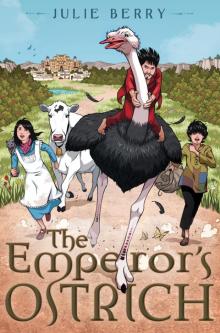- Home
- Julie Berry
The Passion of Dolssa Page 2
The Passion of Dolssa Read online
Page 2
“Botille,” Astruga said, her smile still as bright, “I need to speak with you.”
I lowered my weary leg and caught my breath. I knew what those words meant.
Astruga capered like a baby goat, kicking up her heels and splashing wine into the open, leering mouths of the tozẹts dancing around the vat. And now I knew why, why she’d bribed Ramunda, whose turn in the winepress it ought to have been, to give her this chance to bounce and spin in her purple skin for all Bajas to see. She needed a husband, and fast. Perhaps, she had reasoned, if she played today well, she could find herself one.
Or I could. For that was my job in Bajas. Most tozas helped the family business of catching fish or harvesting salt. Some spun wool or silk; others wove baskets, or helped their papàs and mamàs fashion clay pots. Countless others grew vegetables and tied and trimmed grapevines.
But I, I caught suitors, harvested bridegrooms, wove dowries, fashioned courtships, grew families, and tied and trimmed the unruly passions of our hot-blooded young people into acceptable marriages. I brought them all to Dominus Bernard’s altar in the end. Only sometimes, as now, with a baby on the way, I did not have the luxury of time to plot and plan.
I watched Astruga’s eyes linger on Jacme’s broad face.
“Jacme?” I whispered.
She shrugged. “He’ll do.”
I danced a little closer to her. “Is it he?”
She looked away, and shook her head.
I danced in a circle around her. If she wanted my help, she’d best not turn her eyes away from me. “Who is the father?”
She turned the other way, like a naughty little toza who won’t confess to stealing the honey.
“Tell me,” I pressed. “I have ways of making the father marry you.” And I did. My sisters and I—we had ways all our own.
The high flush in Astruga’s cheeks cooled. “Not this time, Botille.”
Ah. He was married already, then. Well, no matter; Astruga was young and fresh. Weren’t all the tozẹts adoring her even now? This would be easy for me.
“Are you working on another match right now?”
“Maybe.”
“If you marry off that cow Sapdalina before me, I swear, I’ll claw her eyes out.”
It was Sapdalina’s troth I was working on, and while I wouldn’t call her a cow, per se, she was a challenging case. At least she wasn’t pregnant.
“That would hardly be fair to Sapdalina,” I observed.
Her angry face fell. “Oh, please, Botille. I’ll do anything. You’ve got to help me.”
Astruga’s skirt came unpinned and sank into the wine. She squealed and snatched it up, then thrust the soiled cloth into her mouth to suck out the blood-dark juice. Just then the church bells rang, and she let the skirt fall once more.
I looked toward the village, with its white stone walls, its rising houses ready to teeter and topple one another, and the brown square bell tower of the church of Sant Martin.
She’d shown me what, if I hadn’t had a head full of wine and fidel tunes, my instincts should have smelled before Astruga had even spoken a word. The fruit growing in her vineyard was planted by a handsome rake, a delightful talker, a charmer if ever there was one, and the source of all my best clients. I owed him, really. Already a growing list of roly-poly babies had him as the papà they would never know.
Dominus Bernard, Bajas’s priest at the church of Sant Martin.
“Acabansa! Finished!”
Focho de Capa, self-proclaimed lord of the revels, scooped a ladle of syrupy juice from the vat and drank it with great flourish. “Bon an!” A good year, good for the grapes.
We climbed out of the vat. Itier pulled us each out by the wrist onto the platform next to the press and planted wine-stained kisses on our cheeks. We climbed down the ladder. Astruga let herself be seized about the waist by frizzle-headed Itier and led off to the table that had been set up, spread with bread, cheese, salmon, and roasted vegetables. I lingered behind to wipe a bit of the juice off my arms with a rag Na Pieret di Fabri handed me.
Widow Pieret’s eyes were still as blue as la mar, though her face was brown as carved chestnut and creased with as many deep grooves. Her husband, related to the lords of Bajas, had been a vintner, but his death, five years back, left Na Pieret to manage his great vineyards alone. It had been a terrible blow. Still, Na Pieret, who had never been weakened by childbearing, had borne up under the burden admirably. But today, though she smiled, she seemed tired.
“What is it, ma maire?” I genuflected, a courtesy owed to a great lady of advanced years, then I rose and kissed her cheek. All old women were “my mother,” but Na Pieret was someone I could almost wish were my mother.
“Ack! You are covered in viṇ.” She patted my cheek. “Smart Botille. Not a thing happens in this village but what you have a hand in it, is there?”
“Oh, pah.” I unraveled the damp rags from around my hair. “I won’t take the blame for everything.”
Na Pieret leaned against the handle of her cane. I noticed her head quiver slightly. “I need your help, Botille.” She spoke quietly. “I can’t run the vineyards anymore.”
I saw how much it hurt her to speak these words, though she said them simply and without self-pity.
“But your hired help, surely. They do the work for you, non?” I looked over to the feast table, where half a dozen of her hands lounged, stuffing their faces. “Are they lazy? Do they steal from you? Sazia and Plazensa and I can put a stop to that. We’ll teach them a lesson—”
“No, no.” Na Pieret squinted her eyes against the rays of the setting sun. “They are only as lazy as any other laborers ever were. No, they are kind to me.”
“Then what is it?”
“I need a strong back, and eyes I can trust. I need someone who cares about the grapes like they are his own. But you know I have no children to entrust them to.”
The wine on my skin had dried to a slimy, sticky sheen, and I began to itch. Hot breezes from the south did nothing to help.
“My mother had two daughters,” Na Pieret went on. “My younger sister died last winter, leaving her two sons orphans, seven leagues from here, in San Cucufati.”
“Oh?”
She nodded. “I want you to bring them to me. I will give them the farm, and they shall become my sons.”
Seven leagues? I pictured myself traveling seven long leagues with two quarrelsome little eṇfans in tow. What did she think I was, a nursemaid?
“How old are they?”
Na Pieret pursed her lips. “They were sturdy, useful children when I met them last,” she said, “thirteen years ago.”
I smiled, and looked over at Astruga, busy stuffing a piece of bread into Itier’s mouth. “Is either of them married?”
“Botille!” Na Pieret laughed. “You haven’t become one of the desperate tozas yourself, have you?”
“Non, Na Pieret.” I took her by the elbow and steered her toward the table. “But there are always plenty of them about, and now I have two more husbands to offer them.”
Na Pieret tapped my forehead with her swollen knuckles. “Only see to it you don’t marry off my new sons to any of the silly tozas.”
I shoved a half-drunk Andrio aside to make room on the bench for Widow Pieret to sit. “That, ma maire,” I said, “is a promise I doubt I can keep.”
DOLSSA
was a young girl when my beloved first appeared to me. Just a girl of no consequence, the child of pious parents who were much older than most. Mamà used to say I was her miracle eṇfan, the fruit of prayer, just as the prophet Samuel had been. I was happy in my home, and much loved.
Mamà dreamed for me the heaven of the cloister. Nothing would have made her happier than to see me take a nun’s vows. Papà, however, envisioned the joy of family. He wanted grandchildren, and a legacy for his home and name. Poor, gentle Papà would not live long enough to see such a dream. He died not long after my visions first began. I don’t know how I would have en
dured the loss, were it not for my beloved’s secret visits.
We mourned Papà many days. Kinsmen and neighbors came to grieve with us, and condole with my widowed mother. Already they began to speak of me, in whispered voices, as a holy maiden, because I went so often to church. They cupped my cheeks in their hands and spoke blessings upon me. Some were faces I knew, but most, I didn’t. It took me by surprise, seeing so many people claiming Papà’s friendship and commemorating his life. Where were they during that life? Why didn’t I know them? Of course, I’d only known him in his later years. He’d lived a full life before I came along.
I knew Papà had gone to God. But I would miss him so.
“See how she does not cry,” a cousin of Mamà’s whispered to her sister. “She’s serene as an angel.”
I was only shy.
“Oc, see the pious sweetness of her gaze,” said the sister. “Like one of the blessed saints.”
I watched my mother, wishing she’d stop talking to all these family strangers.
There was a man there, tall and grim. He spoke to my mother in a low voice. I went to her side and slipped my hand in hers.
“Bound for the church,” my mother was saying. “It’s out of the question.”
The man’s eyes examined my face. “She is very young.”
I inched back behind Mamà.
“She will be a nun,” my maire said firmly. “It is already settled.”
The tall man tipped his hat to my mother. “My sorrow for your loss.”
I didn’t understand then what he must have been asking. I only knew that I would never be a nun. A bride of Christ, oc, but the cloister could never enclose all my love. It was too vast, too deep for such walls, such silence, such seclusion.
I left my maire’s side and went and lit a candle for Papà. How I would miss his step in the hall, and his laugh at dinner. I was thirteen, and now Mamà and I were left alone.
Not long after mon paire died, the fires began. What once were sweet visions now burned in my soul, in my brain, in my blood. My beloved, pouring his presence over me, consumed me with his love. I couldn’t sleep. I could scarcely eat.
Mamà thought I mourned Papà. It was easy enough to let her think that.
The world grew dull to me. Tolosa, the vibrant pink city, the trobadors’ own rose of Europe, became dismal, tired, and brown. My will to remain in it grew slack.
My beloved was my great romance, and—impossible miracle!—I was his. He caught me up on wings of light, and showed me the realms of his creation, the glittering gemstones paving his heaven. He left my body weak and spent, my spirit gorged with honey.
There are no words for this. Like the flesh, like a prison cell, so, too, are words confining, narrow, chafing, stupid things, incapable of expressing one particle of what I felt, what I feel, when I see my beloved’s face, when he takes me in his arms.
There is only music. Only light.
And no one may take it from me.
I told no one what was happening to me. My beloved was the most private secret of my soul.
Mamà began to speak of the abbey for me, and I refused to go. We quarreled bitterly, and grew cold with each other. At length she relented, with a heavy heart, and began to speak cautiously of me marrying. If I would not fulfill her dreams for me, I supposed, she was willing to concede that Papà’s hopes had been honorable. There was a kinsman, she said. A goodly man, well respected. He had asked Papà about me once, and Papà had been pleased. In a panic I told her my heart was already taken. At this she became sick with worry that I had sinned. So, at my beloved’s urging, I told her the truth about us.
She believed me. Relief made it easy for her to believe. Her maternal pride thrilled to think of me as being touched by divine grace. The next evening, she brought a cousin over to hear my tale. I wasn’t happy, but I was glad enough to have the anger between us abated that I told my story anyway.
The next evening, Mamà brought another friend, and her cousin brought two others.
I was troubled, so I went to my love for guidance. He asked me if I would, for his sake, tell many about the loving kindness he’d lavished upon me. Within a week our house was full to overflowing. I found myself, against every instinct—for I would far rather have remained in my room, in the solitude where my beloved could find me—speaking to houses full of listeners, night after night.
I began to venture out of doors more, not to preach, but merely to taste the world, see the city bloom in high summer. I smelled fresh breezes blow across the winding Garona River, and watched larks flit about the porticos of Our Lady de la Daurada.
But I also saw a city still bruised and bleeding from years of crushing war. I saw souls darkened by loss and bitterness in the crusades. I saw faith destroyed after the brutality we’d endured in its name. Then I understood why my beloved had sent me.
So I opened my mouth to teach the only lesson I knew. Of love everlasting, of mercy reaching beyond the prison walls of death, of the bliss that awaits us when we die.
What a feeling it was, after a lifetime lived in my parents’ house, to be part of the world and make a difference in it. To do something, however small. To speak, and be heard, if only in my own home. I thought I would speak in the city squares, but Mamà forbade it. “You do not dare do such a thing,” she said. “This city is full of inquisitors, combing through the people for hidden heresies. To preach on the street is to arouse their alarm.”
It didn’t matter. People came. People sat outside and listened under windows. Just so, I later learned, did one eager young inquisitor and his elderly companion sit and listen. I didn’t know it at the time.
I preached almost daily. One day, I remember, I saw the tall man who had come to our home when Papà died. He sat and listened to me speak. His face was so grave, he frightened me. Afterward, while the other guests mingled and broke bread, he approached and thanked me for my holy message. He offered me a pair of apricots. They sat so temptingly soft in his hand—did he know I couldn’t resist apricots?—but I said no. A storm cloud moved across his eyes. He bowed and walked away.
Not long after, Friar Lucien de Saint-Honore began to preach in the square closest to our home. His voice was musical, but his accent was French and northern. He had keen dark eyes that missed no detail. Were he not a tonsured friar, he might have been a comely man.
Day after day he returned, raising his voice of warning. I could hear him from the upper window where I sat. We must flee the treacherous heresy, he said, that entwined itself around our way of life—the false beliefs that slithered through the grasses of our fair Provensa, with false teachers leading people away from the true faith and toward unholy rituals and vows. Lucifer’s enticements, he warned, were no less beguiling today than those he’d planted in the Garden. The heretics, those false teachers of no authority, were serpents, and we ignorant Tolosans were Eve, deadly fruit poised upon our lips.
Upon my lips.
In our Father’s house, I told the believers, there is never alarm, but only gladness, love, and peace.
Not long after that, the interrogations began.
BOTILLE
made my first match when I was thirteen, but it was so easy, I don’t know if I should even claim credit for it. Make no mistake, I charged a fee. I never let qualms get in the way when money is involved.
We had only just moved to Bajas, my sisters and Jobau and I, and taken over the derelict tavern on the skirts of town, near the water but not too near, for Plazensa required an ale cellar. The villagers still looked at us with some suspicion. We weren’t local. We spoke Oc, but our accents were different. We came from the city of Carcassona, and we weren’t a fishing family. And then there was Jobau. Mamà had charged us to look after him, keep him out of the way, and prevent him from provoking others. Plazensa grew skilled at fermenting just about anything, and we followed Mamà’s orders by keeping Jobau drunk.
The fishwives especially distrusted Plazensa, who at sixteen stood tall and buxom,
with the thickest head of long black curls this side of the Pirenèus Mountins. I didn’t attract much notice, but Sazia did. At nine, she wore boys’ trousers and wandered up to villagers offering to tell their fortunes for a penny. She made people wonder. They wondered all the more when Sazia’s predictions about where the fisherman would net the greatest haul proved right again and again.
Plazensa said we should call the tavern the Three Skylarks. Sazia suggested the Three Pigeons, and it stuck. “After all,” she said, “you might bake a pigeon into a pie, but never a skylark.” All that summer as we patched and painted the tavern, and Plazensa scolded me for not doing enough to help, I watched out the window as the goat-cheese man’s daughter, Lisette, sat in her parents’ back garden, uphill from us, eating plums and stitching something in her little cloth book. To this day I can’t think of her without picturing her sticky mouth and stained embroidery.
I wasn’t the only one watching her. A goosenecked young ome, Martin de Boroc, spied on her daily through the shrubs that divided her gardens from ours. How she never saw him says much about her great stupidity, but as I say, matchmaking is nothing more than paying attention.
Martin de Boroc’s father died at the end of that summer, leaving him his fishing boat, ensuring Martin would starve neither himself nor any future wife to death. So finally, one day, when I could no longer bear the suspense of wondering whether he would, for the love of Santa Sara, show his face to Lisette through the trees, I knocked on Lisette’s parents’ door.
Paul Crestian, Lisette’s papà, kept his flocks of goats in an enclosure that stretched behind both of our homes. He stored his cheeses in his damp cellar. It is a fattening occupation, tasting every batch of creamy cheese to make sure it is just so. He answered the door and frowned at me over his round belly. “Oc?” he said. “You are the new girl from next door? The plain one, with the pretty older sister and the little duck of a younger sister.”

 The Amaranth Enchantment
The Amaranth Enchantment Secondhand Charm
Secondhand Charm All the Truth That's in Me
All the Truth That's in Me Lovely War
Lovely War The Emperor's Ostrich
The Emperor's Ostrich The Passion of Dolssa
The Passion of Dolssa Wishes and Wellingtons
Wishes and Wellingtons The Scandalous Sisterhood of Prickwillow Place
The Scandalous Sisterhood of Prickwillow Place Amaranth Enchantment
Amaranth Enchantment